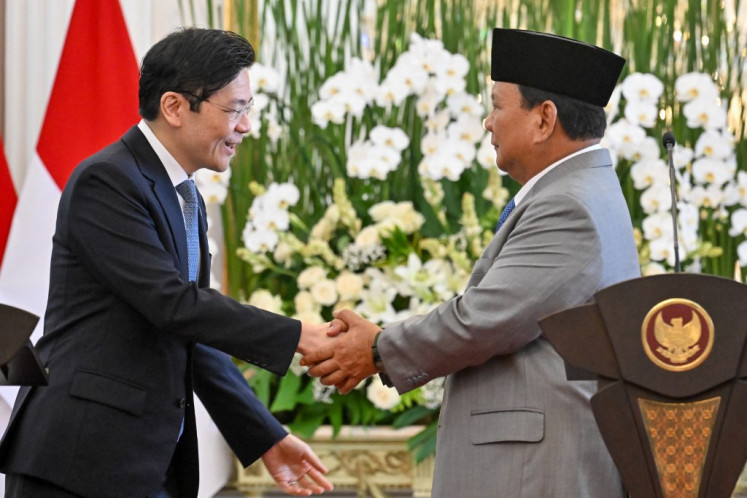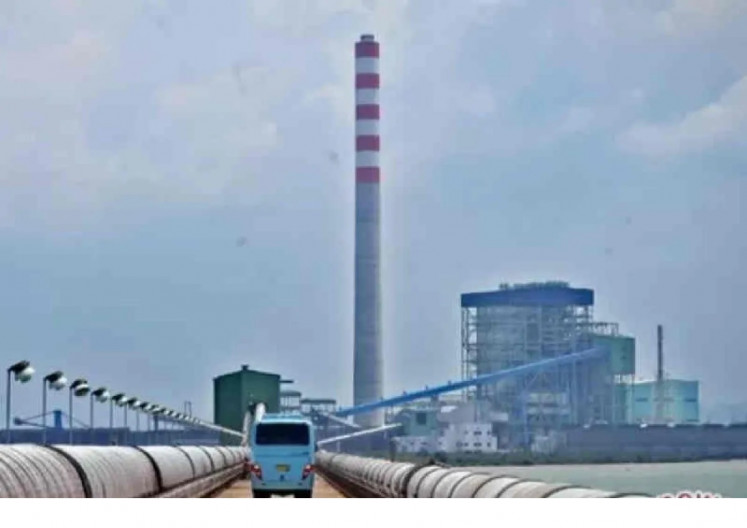The EU’s ‘voluntary’ coercion
The EU is stalling on a timber legality agreement with Indonesia
Change text size
Gift Premium Articles
to Anyone

T
he EU is stalling on a timber legality agreement with Indonesia. Indonesia should consider economic retaliation.
Indonesia’s forestry officials are wondering why the EU has stalled a complex, multi-year program that enables Indonesian wood and paper producers to demonstrate that their products are legal.
Indonesia has satisfied the EU’s request to negotiate and sign a “Voluntary Partnership Agreement [VPA]” expressly for this purpose.
The EU has negotiated 11 VPAs with 27 nominated timber-exporting nations. The largest of these is Indonesia. None of these agreements have come into effect.
Much is at stake. Indonesia wood and paper product exports to the EU earned nearly US$ 1.3 billion in 2011. More than 18 million people work in small and micro timber and timber product businesses in Indonesia. Most of these are small, family-run firms.
The EU is stalling until another new law — the European Union Timber Regulation (EUTR) — is implemented in March 2013.
This new law will restrict timber imports from countries that have not negotiated a VPA-agreement. It will include a different test to demonstrate legality.
The legality arrangements required by the EU on imports of timber products are costly. A report commissioned by the EU stated that under a VPA, the Indonesian wood products sector would face drops in value-added of 12 percent. The cost of compliance with the Timber regulation will probably be higher. It requires importers to verify the legality of products.
The EU has already stated publicly that getting Indonesia’s small and micro firms ready for compliance is difficult. Some would consider it impossible.
Is the EU practicing “bait and switch”? This is a well-known and illegal ruse in the US, particularly for booking hotel rooms. A customer makes a booking, but when they arrive only more expensive rooms are available.
The EU’s formal justification for the program is to end illegal logging and protect the environment. But restricting Indonesian imports and making them more costly also suits the interests of leading European businesses that are having trouble competing with the cheaper Indonesian products.
They have campaigned unsuccessfully to block timber and paper imports from Indonesia in the US, the EU and Australia with claims they have been dumped.
They have allied with and occasionally fund environmental NGOs like the World Wide Fund for Nature (WWF) and Greenpeace, who are now routinely greenmailing Western companies not to buy Indonesian products. Last week’s row over Disney’s new procurement policy is a case in point.
The Blair government put illegal logging on the global map at a G8 conference in 1998 after lobbying by these NGOs. The contention was that trade in illegal timber trade was a leading driver of deforestation. This was never the case. A new report published the UK and Norwegian governments states that the greatest driver of deforestation is clearing forest to grow food, and mostly by poor people. Yet both governments continue to support argue illegal logging is the driver.
Similarly, Greenpeace and the WWF perpetuate in report after report the falsity that illegal timber threatens tropical rainforests at large. This is just a dramatic way to screen their real aim, which is to halt conversion of forest for other uses, including production of food.
The Indonesian government has significantly reduced levels of illegal logging. According to one estimate, illegal logging has fallen by 75 percent in Indonesia over the past decade. Indonesia’s leading paper producers have committed to use only plantation timber.
Indonesia has moved and is ready to move further, but Europe is not. It is well known that the UK and EU want more than a demonstration of legality from exporters. Both want global rules for managing forests, but they have never won global support for this position.
WWF wants global supply chains for wood products and paper regulated by its own forest certification standard which has shown itself to be too costly for small operators in developing countries.
Regardless of the reason for the hold-up, the EU is now threatening to block Indonesian paper and timber exports by default. This will be the result if they fail to activate the VPA.
When the EU announced its VPA strategy, it stated that if exporting countries did not go along, it would restrict their trade.
The EU is on very shaky ground in this regard. The VPA and the EUTR contain features which put the EU in breach of WTO rules. This is borne out by recent rulings in the WTO on misuse of environmental measures to restrict trade.
EU President Jose Manuel Barroso canceled visit to Indonesia last week due to the EU’s fiscal problems. But many European businesses are benefitting from Indonesia’s strong growth, and the EU should make trade with Indonesia a priority — it should not be leaving one of Indonesia’s major export industries in limbo.
Indonesia need not wait for the lengthy and time-consuming WTO processes to click into gear to examine the case. The potential losses to Indonesia’s 18 million forest-based businesses from threats of blockage of trade warrant
economic retaliation.
There are plenty of European businesses currently benefitting from Indonesia’s strong growth and are interested in investing further in Indonesia.
Why should the EU and UK think it reasonable to propose action that threaten Indonesia’s economic interests and not expect retaliation?
The writer is chairman of World Growth.









